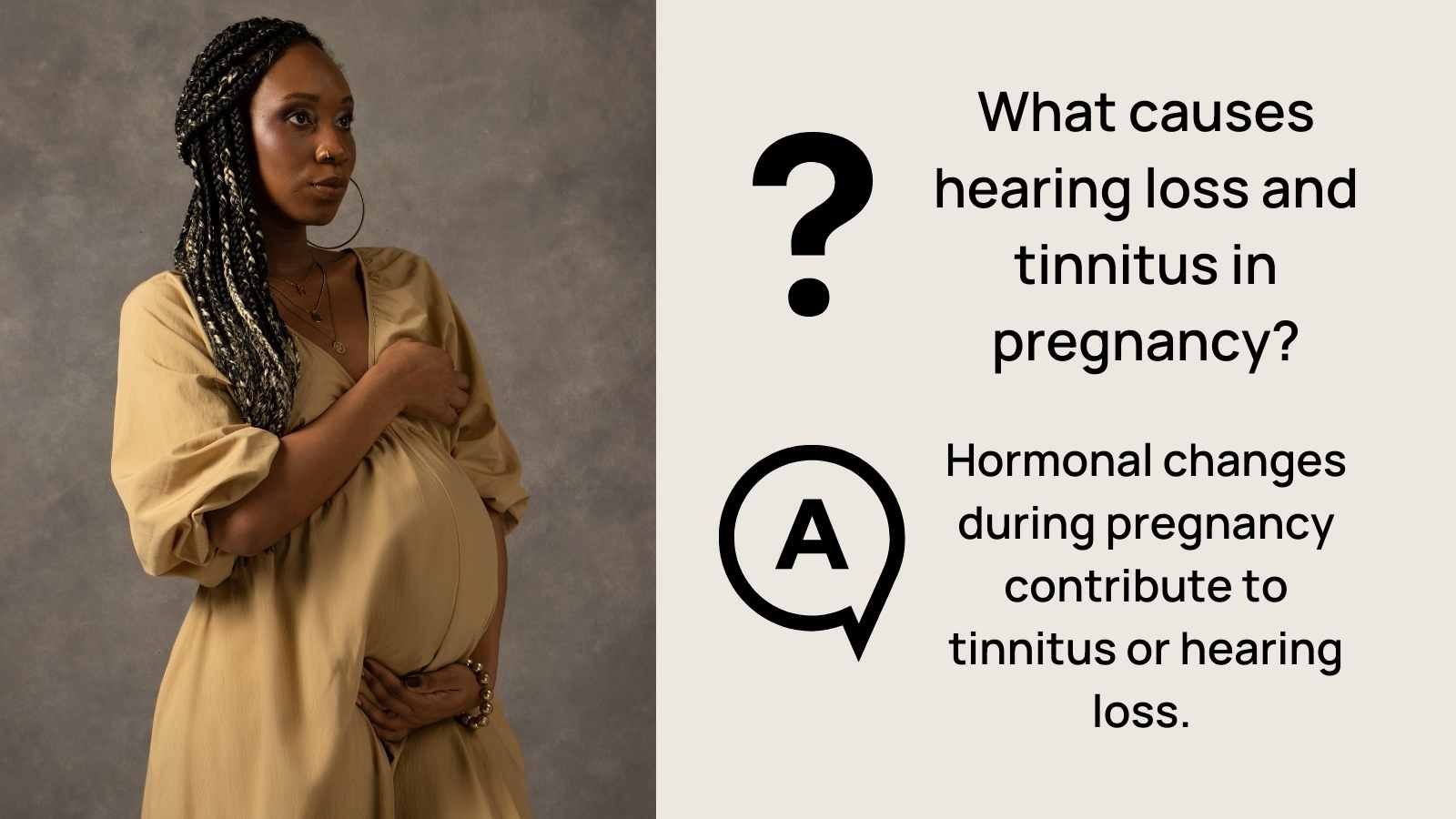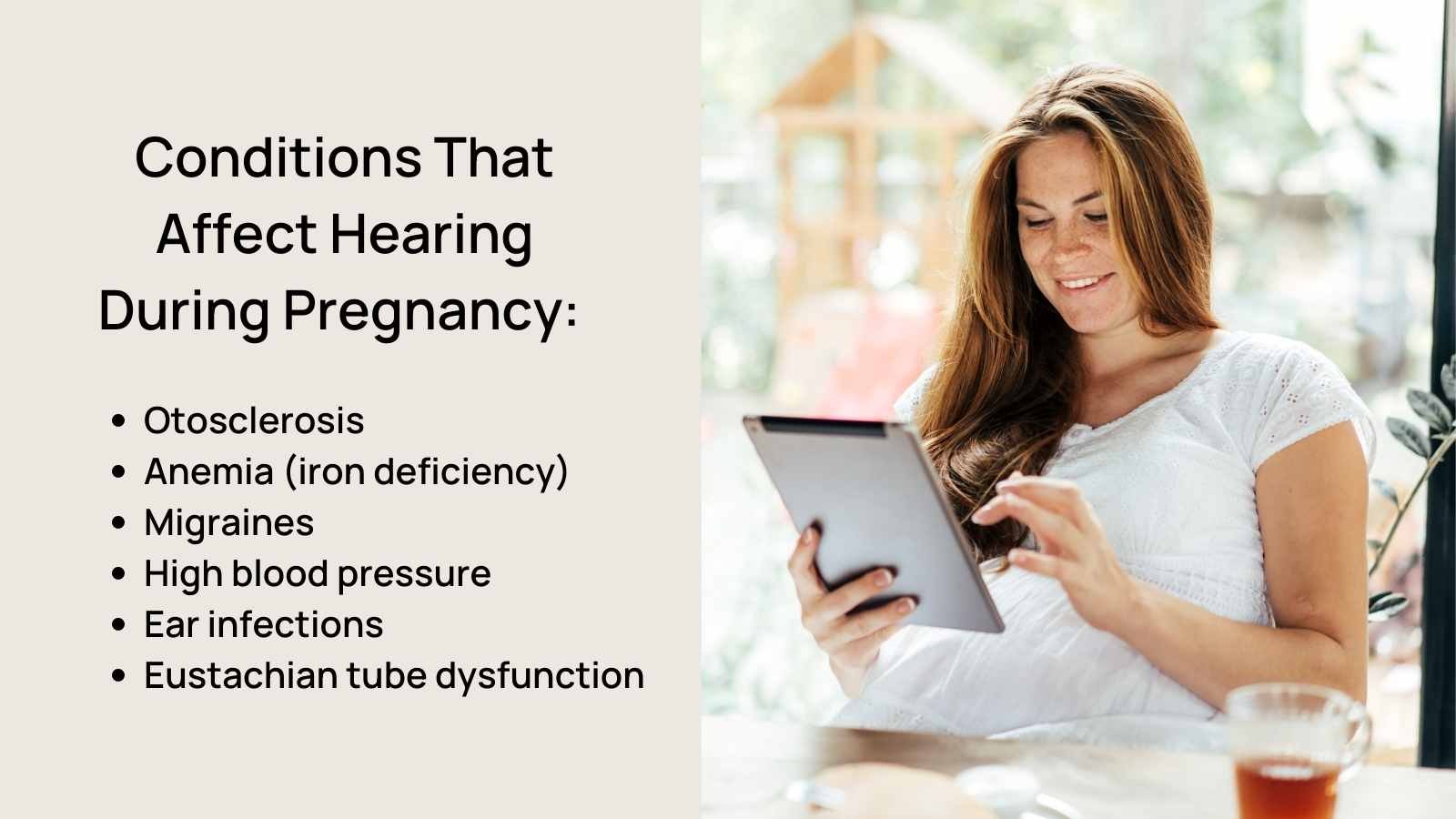Key Takeaways:
- Pregnancy can cause a change in hormones, which may contribute to some common causes of hearing loss that develop in pregnancy.
- Some examples of conditions that can cause hearing loss in pregnancy include: anemia, otosclerosis, migraines, and ear infections.
- Anyone who experiences changes in hearing should seek medical attention.
- With proper treatment, many of these conditions are reversible.

Pregnancy is an exciting time for many expecting parents, but it can also be a time of many changes and possible health concerns. One such condition that can occur during pregnancy is hearing loss or tinnitus. As an audiologist, I work with hearing loss, tinnitus, and ear-related concerns daily.
Many people who experience these conditions may have questions about changes in hearing or tinnitus and the steps they can take to get relief. Read on for more information about hearing loss and tinnitus during pregnancy, including causes, treatment options, and when to see a doctor.
What causes hearing loss and tinnitus in pregnancy?

Several factors may contribute to hearing loss and tinnitus during pregnancy. One of the main culprits is hormonal changes that occur during pregnancy. Some of the common reasons for hearing loss or tinnitus during pregnancy include:
- Otosclerosis
- Anemia (iron deficiency)
- Migraines
- High blood pressure
- Ear infections
- Eustachian tube dysfunction
Now, let’s dive deeper into these conditions and how they can affect hearing.

Otosclerosis
Otosclerosis is a hereditary type of conductive hearing loss that affects women more frequently than men. Bony growth around the stapes footplate, part of the bones in the middle ear, leads to this type of hearing loss.
While pregnancy does not cause otosclerosis, research suggests that otosclerosis can worsen during pregnancy. According to a recent study published in Cambridge University Press, 44 percent of women surveyed (1805 in total), noticed a change in their hearing.
In addition, the women surveyed reported that their hearing difficulty due to otosclerosis began most commonly during pregnancy rather than before or after pregnancy.
Anemia
During pregnancy, some women may experience iron deficiency anemia which increases the likelihood of hearing loss and tinnitus. While not a direct cause, one JAMA study suggests a correlation between iron deficiency anemia and high-frequency sensorineural hearing loss.
Of note, this study observed a large population of adults and not specifically just pregnant people. Additionally, low iron levels can make the heart work harder due to reduced blood oxygen levels. Changes in blood flow can cause tinnitus in some cases.
Migraines
Migraines affect millions of people worldwide and can have many causes. For some women, changes in hormone levels during pregnancy can worsen migraines. When most people think of migraines, they think of headaches.
But did you know that there are migraine variants that cause hearing loss, tinnitus, and dizziness with or without a headache? This JAMA study shows that migraineurs are more likely to have hearing loss and tinnitus than those without a migraine history.
High Blood Pressure
High blood pressure can sometimes occur during pregnancy in a condition called pre-eclampsia. In addition, increasing the force of blood flow can sometimes lead to high blood pressure-induced tinnitus.
Ear Infections
During pregnancy, a person's immune system undergoes modulation to protect the unborn baby's health. These changes do not suppress the mother's immune system, per se. However, they can result in the mother's immune system responding differently to germs and bacteria, depending on the trimester of the exposure. Subsequently, people may experience ear or sinus infections during pregnancy, temporarily leading to worsening hearing or tinnitus.
Eustachian Tube Dysfunction
Changes in hormones and immune function can make expectant mothers more prone to stuffiness or clogged ears. In fact, one small study found that pregnant women experienced more frequent Eustachian tube dysfunction in the third trimester.
How can I get relief?

If you are experiencing hearing loss or tinnitus during pregnancy, there are several strategies to help find relief. First, let's go through some easy home remedies.
Clogged Ears and Muffled Hearing
Have clogged ears that make it hard to hear? Try a saline spray or the Valsalva Maneuver if you suffer from allergies or sinus congestion. Another home-based option is steam inhalation. To do this, you'll start by boiling some water, placing it in a bowl, and placing a towel over your head while inhaling the water vapor for several minutes.
These methods are generally safe to help temporarily clear congestion or clogged ears. If you want to try OTC decongestants or antihistamines, speak with your OB-GYN or doctor first.
Tinnitus
Pregnancy is a stressful life event, and stress can undoubtedly worsen tinnitus. Trying to carve out some time for self-care is essential and can help reduce tinnitus. Don’t forget to hydrate, because staying well-hydrated and getting good rest improves overall well-being. Want more helpful tinnitus management strategies? Click on over to this article right here.
Will hearing loss last after pregnancy?

It's important to note that not all cases of hearing loss or tinnitus caused by pregnancy will last beyond delivery. The course of your symptoms depends on what is causing the muffled hearing or tinnitus.
For example, ear infections often resolve with pharmacological treatment, while otosclerosis may require surgery or hearing aids to treat the hearing loss effectively. In addition, conditions such as pre-eclampsia or anemia may improve after pregnancy, after which the symptoms they cause may also disappear. Your physician can advise you on your specific situation.
When to See a Doctor

It's crucial for pregnant women who experience any hearing issue—even if it’s only temporary—to seek medical attention so their doctor can diagnose and provide treatment as needed. While some cases of hearing loss or tinnitus caused by pregnancy will resolve independently with time, it's still best to speak with your doctor. Hence, you understand your situation better and know what steps to take next if your symptoms persist beyond delivery. Talk with your doctor for specific treatment recommendations. And in the case of a sudden change in hearing, see an ENT or audiologist immediately.
Conclusion
Hearing loss and tinnitus during pregnancy are common due to hormonal changes in combination with circulatory system changes occurring within the body throughout gestation.
These conditions may resolve themselves following delivery. However, seeking medical attention and consulting your physician regarding concerns or changes is essential. With proper care and management techniques, you'll be on your way to feeling better soon.



.jpg)


